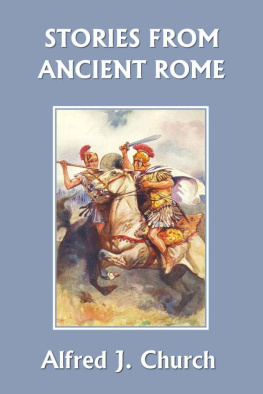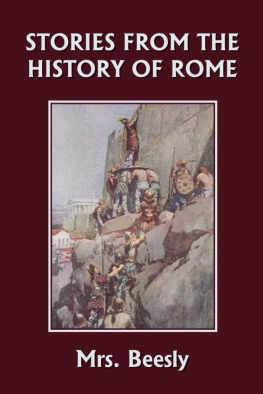I. THE BUILDING OF ROME
THERE once reigned in a town called Alba in Italy a king whose name was Numitor. He had a brother called Amulius, who was a proud and wicked man, and could not bear that his elder brother should be king over him. So Amulius plotted against his brother. He got together a number of men who were as bad and cruel as himself, and they attacked Numitor and drove him from his throne, and made Amulius king in his stead. They took the sons of Numitor, and his daughter Rhea Silvia, and killed them. Then Amulius seized the two little sons of Rhea Silvia, who were still only babies; he gave them to his soldiers, and told them to throw the poor little boys into the River Tiber.
"Then," thought he, "they will be drowned. There will be none of my brother's children left to trouble me, and I shall be king all my life."
The soldiers took the two babies in their cradle, lying side by side fast asleep, and carried them to the river.
Now, there had been a great deal of rain, and the Tiber had overflowed its banks, so that the men could not put the children in the deep part of the river, but only at the edge, where the water was shallow. However, they thought that they would have obeyed the orders of Amulius if they left the little boys there. So they put the cradle down in the water, and went away.
But the sun was shining, and the waters were sinking fast; soon the dry land began to show itself; the cradle stood still, and the waters left it on the bank and ran back into their bed.
There lived not far from the Tiber a shepherd whose name was Faustulus. He was walking by the side of the river, when he saw a cradle lying under a fig-tree, and beside the cradle stood a great she-wolf. Faustulus was very much astonished, and ran quickly to see what this might mean. When he got near, he saw that in the cradle were two beautiful little baby boys, and the wolf was feeding them with her milk, just as if they had been her own little ones. But when she saw Faustulus, she fled away into the woods; and he took the children and carried them home to his wife. So these two kind people loved the boys and brought them up like their own sons.
Romulus and Remus, so the boys were called, grew up strong and bold and active. They did not care to till the ground and herd the cattle, but loved to hunt in the woods and mountains. Sometimes, too, they would attack the robbers whom they met in that wild land, and take their plunder from them. So, it happened that many young men from the country round came to them and joined their expeditions, and of these Romulus and Remus were always the chiefs and leaders.
Faustulus had heard that two grandsons of the king had been thrown into the Tiber, and he guessed that these must be the boys he had found. When Numitor, their old grandfather, heard of these two young men, he too thought they must be his daughter's sons. Then Romulus and Remus took their friends and companions with them, and went to Alba. They attacked King Amulius and killed him. When Numitor heard of what had happened, he called the Alban nobles together, and told them of all the wrongs he had borne from his brother, and all the story of his grandsons. While he was still speaking, the two brothers marched with their followers into the midst of the assembly, and they hailed their grandfather as King of Alba, to the great joy of all the Alban people.
Now Romulus and Remus were not content to stay at Alba with their old grandfather; but they determined to build a new city for themselves. They made up their minds that this new city should be near the River Tiber, on the spot where they were found by Faustulus when they were little babies. So they took their companions with them, and went to that place. There was still growing the fig-tree under which their cradle had lain, and they resolved that they would build their walls there, and leave the fig-tree standing in the midst. For hundreds of years afterwards the fig-tree was to be seen standing in one of the chief streets of Rome.
The walls were soon begun, but while they were building, the two young men began to quarrel. Remus spoke scornfully to his brother and laughed at him, and jumped over the wall that Romulus had just begun to raise. Romulus was very angry, and in his rage he struck his brother and killed him.
Thus he became the only leader and king. He finished building the city, which he called Rome after his own name. He ruled it for many years, and after his death the Romans worshipped him as a god.
II. THE HORATII AND THE CURIATII
IN the reign of King Tullus Hostilius there was a quarrel between the people of Rome and the people of Alba. The Romans and the Albans were generally very friendly to each other. They were of the same race; their way of living was the same, and they spoke the same language. Some of the Romans had married Alban women, and some of the Albans had married Roman women, so that each people had friends and relations in the other town.
But now there was a quarrel between them, and the Roman army with King Tullus at its head marched out to meet the Albans, who were commanded by their Dictator, Mettius Fufetius.
When the armies came near together, the Alban Dictator sent a messenger to King Tullus. The messenger came to the Roman army, and was led before the king, who was preparing himself for the battle.
Now, Tullus was a brave warrior; he was young and strong, and eager to win glory in war; but still he was wise, and he did not refuse to listen to the message of Mettius. "O Tullus," said the messenger, "I am sent to you by the Dictator of the Albans. He bids me tell you, that it will be much for the good of Rome as well as for the good of Alba if you will come out in front of your army, and speak with him before the fight begins."
Tullus agreed to do as Mettius asked. The two armies took their places, and all was made ready for battle; and then Mettius and Tullus, followed by some of their nobles, advanced midway between the armies, and Mettius spoke these words,
"Hear me, King Tullus, and you nobles of Rome. It seems to me that the only cause of our quarrel is that we know not whether Rome or Alba is the stronger, and which town shall be the master of the other. Can we not decide this in some other way than by the death of all the brave men who must be slain if we begin to fight?"
The thought pleased King Tullus, and after consulting together, they fixed upon a plan. It was agreed that three Romans should fight against three Albans, and that if the Romans conquered, Rome should govern Alba; but if the Albans were victorious, then Alba should govern Rome.
It happened that in the Roman army there were three brothers called Horatius, all strong men and brave soldiers. They were the sons of an old Roman named Publius Horatius, who had taught them, as Roman fathers in those days taught their sons, that they ought to be ready to die for the good of their people and their dear city of Rome. That was the first duty of every Roman, and you shall hear how the Horatii kept their father's sayings.
The Roman army felt that they could choose no better champions than these three brothers. And the Horatii proudly and gladly agreed to fight, and each in his heart resolved to do his very best to save his country from being subject to Alba.







